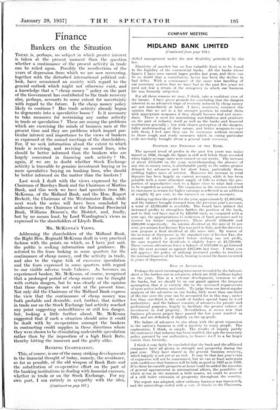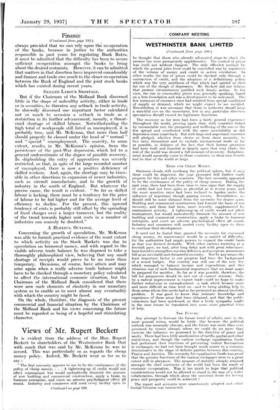Finance
Bankers on the Situation
THERE .is, perhaps, no subject in which greater interest is taken at the present moment than the question whether a continuance of the present activity in trade can be relied upon. Possibly the recollections of the years of depression from which we arc now recovering, together with the disturbed international political_ out- look,. have occasioned an anxiety with regard to the . general ontlook which might not otherwise exist, and a _knowledge that a " cheap money " policy on the part of the Government has contributed to the trade recovery alsO, perhaps, accounts to some extent for uncertainty With regard to the future. Is the cheap money policy likely to continue ? Has trade activity already begun to degenerate into a speculative boom ? Is it necessary to take measures for restraining any undue activity in trade or speculation ? These are among the problems which are exercising the minds of business men at the present time and they are problems which impart par- ticular interest and importance to the views of bankers as expressed at the annual meetings of the shareholders. l'or, if we seek information about the extent to which trade is reviving, and reviving on sound lines, who should be better informed than the bankers who are largely concerned in financing such activity ? Or, again, if we are in doubt. whether Stock Exchange activity is traceable to genuine investment buying or to mere speculative buying on banking lines, who should be better informed on the matter than the bankers ?
Last week I dealt with the views expressed by the Chairman of Barclays Bank and the Chairman of Martins Bank, and this week we have had speeches from Mr. McKenna, of the Midland Bank, and the Hon. Rupert Beckett, the Chairman of the Westminster Bank, while next week the series will have been concluded by addresses from the Chairmen of the National Provincial Bank, Williams Deacon's, the District, and, finally, but by no means least, by Lord Wardington's views as expressed to the shareholders of Lloyds Bank.
MR. MCKENNA'S VIEWS.
Addressing the shareholders of the Midland Bank, the Right Hon. Reginald McKenna dealt in very practical fashion with the points on which, as I have just said, the public is seeking information and guidance. He referred to the fears lurking in some quarters for the continuance of cheap money, and the activity in trade, and also to the vague talk of excessive speculation and the fears expressed in some quarters with regard to our visible adverse trade balance. As becomes an experienced banker, Mr. McKenna, of course, recognised that a prolonged period of cheap money can be fraught with certain dangers, but he was clearly of the opinion that those dangers do not exist at the present time. Not only did the Chairman of the Midland Bank express the view that the continuance of cheap money was both probable and desirable, and, further, that neither in trade nor on the Stock Exchange had activity reached any point suggesting unhealthiness or still less danger, but, looking a little further ahead, Mr. McKenna suggested that if such a situation should arise it could be dealt with by co-operation amongst the bankers in contracting credit supplies in those directions where they were shown to be stimulating undesirable speculation rather than by the imposition of a high Bank Rate, thereby hitting the innocent and the guilty alike.
BANKING CO-OPERATION.
'• This, of course, is one of the many striking developments inthe financial thought of today, namely; the avoidance; so far as possible, of the old weapon of Bank Rate and. the substitution of co-operative -effort on the part of the banking institutions iii-dealing with financial excesses," Whether in trade or on the Stock Eichange. For my (Aril. part, I am entirely in sympathy with the idea,- (Continued on page 197.)
- Finalice
(Continued from page 195.) always provided that we can rely upon the co-operation of the banks, because in justice to the authorities responsible in past years for regulating Bank Rates, it must be admitted that the difficulty has been to secure sufficient co.operation amongst the banks to bring about the desired restraints. However, it can be admitted that matters in that direction have improved considerably and finance and trade owe much to the closer co-operation between the Bank of England and the joint stock banks which has existed during recent years.
SKILLED LABOUR SHORTAGE.
But if the Chairman of the Midland Bank discerned little in the shape of unhealthy activity, either in trade or in securities, to threaten any setback in trade activity, he shrewdly discerned one important factor calculated not 'so much to occasion a setback in trade as a restriction in its further advancement, namely, a threat- ened shortage of skilled labour. Notwithstanding the high total of workpeople still listed as unemployed, it is probably true, said Mr. McKenna, that more than half should properly be classed under the head of " normal " and " special ' unemployment. The scarcity, to some extent, results, in Mr. McKenna's opinion, from the persistence of the post-War depression, which led to a general underestimate of the degree of possible recovery. In shipbuilding the entry of apprentices was severely restricted, so that, in spite of the large recorded number of unemployed, there is now a positive deficiency of skilled workers. And, again, the shortage may be trace- able in other directions to expansion of newer industries, such as aircraft manufacture, and to the growth of industry in the south of England. But whatever the precise cause, the result is evident. " So far as skilled labour is lacking, there must be a tendency for the price of labour to be bid higher and for the average level of efficiency to .decline. For the present, this upward tendency of costs is probably still offset by the spreading of fixed charges over a larger turnover, but the reality of the trend towards higher unit costs in a number of industries can scarcely be doubted."
A HOPEFUL OUTLOOK.
Concerning the growth of speculation, Mr. McKenna was able to furnish practical evidence of the scant extent to which activity on the Stock Markets was due to speculation on borrowed money, and with regard to the visible adverse trade balance he was disposed to take a thoroughly philosophical view, believing that any small shortage of receipts would prove to be no more than temporary. Occasions, of course, have arisen and may arise again when a really adverse trade balance might have to be checked through a monetary policy calculated to affect the international economic situation, but the Chairman of the Midland Bank considered that there were now such elements of elasticity in our monetary system as to enable us to meet almost any eventuality with which the country might be faced.
On the whole, therefore, the diagnosis of the present commercial and financial situation by the Chairman of the Midland Bank- and his views concerning the future must be regarded as being of a hopeful and stimulating character.























































 Previous page
Previous page